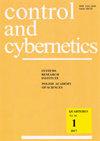离散时间马尔可夫跳变线性系统
Q4 Engineering
引用次数: 173
摘要
本文章由计算机程序翻译,如有差异,请以英文原文为准。
Discrete-time Markovian jump linear systems
求助全文
通过发布文献求助,成功后即可免费获取论文全文。
去求助
来源期刊

Control and Cybernetics
工程技术-计算机:控制论
CiteScore
0.50
自引率
0.00%
发文量
0
期刊介绍:
The field of interest covers general concepts, theories, methods and techniques associated with analysis, modelling, control and management in various systems (e.g. technological, economic, ecological, social). The journal is particularly interested in results in the following areas of research:
Systems and control theory:
general systems theory,
optimal cotrol,
optimization theory,
data analysis, learning, artificial intelligence,
modelling & identification,
game theory, multicriteria optimisation, decision and negotiation methods,
soft approaches: stochastic and fuzzy methods,
computer science,
 求助内容:
求助内容: 应助结果提醒方式:
应助结果提醒方式:


